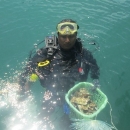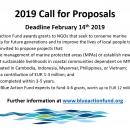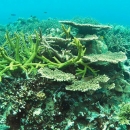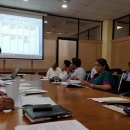Topics :: Enhance governance :: Marine Protected Areas
Marine Protected Areas
Life on earth began in the seas which harbors a wider range of biological diversity than land. Despite the fact that a majority of life forms exist in the oceans and seas, and that they are, the biggest provider of human sustenance in many countries and the most common means of goods transport, they are increasingly becoming degraded due to wide neglect and their status as common property.
IUCN defines marine protected areas as: "Any area of intertidal or sub-tidal terrain, together with its overlying water and associated flora, fauna, historical and cultural features, which has been reserved by law or other effective means to protect part or all of the enclosed environment," MPAs are ocean areas that have been demarcated with limited human activity, or in some cases total prohibition, to conserve and protect the natural marine resources, ecosystems and genetic diversity. In addition to ecological objectives marine protected areas also serve to ensure human welfare, education, recreation and cultural preservation. They are generally governed with more stringent regulations than surrounding areas.
Despite two thirds of the earth surface is covered by oceans, marine protected areas only makes up a fraction of terrestrial protected areas. Coastal areas remain poorly represented in the national protected area networks of the countries participating in MFF, and many vitally important or threatened coastal ecosystems do not have protected status. Greater representation is required to address these gaps in coverage, and to ensure that critical ecosystems are conserved.
As part of the MFF preparatory activities a gap analysis to review existing protected area coverage, identify regionally or nationally under-represented ecosystems, and recommend areas in need of additional protection was conducted. The MFF countries are at different stages in developing their protected area systems, and needs vary accordingly. Even where good intended protected areas have been established in coastal areas, some remain “paper parks”, as there is weak capacity and inadequate funding to manage them effectively. There is also a strong need to support measures to improve management effectiveness, including designing protected areas for resilience linked to climate change, improved integration with tourism, support to participatory management approaches, improving buffer zone management, and identifying sustainable financing mechanisms. MFF has approved its first large project under this PoW,” Evaluating and improving the management effectiveness of Thailand's Marine and Coastal Protected Areas.
For details about Actions, Outputs and Results, click [ + ]
Related News
MFF-UNEP regional project Green Fins goes digital
Asia Region 03 Feb 2014
Topic: Marine Protected Areas
MFF regional project in Maldives and Viet Nam get spotlight as Green Fins launches www.greenfins.net, a new digital platform featuring best practice in diving industry, and the Top 10 best dive operators applying the Green Fins approach.
MFF India Small Grant Mid-term Review
New Delhi, India 21 Sep 2012
Country: India
Topic: Knowledge for Management, Strategies for Management, Monitoring, Learning and Evaluation ...
The small grant mid-term review is a useful mechanism through which the progress of projects is evaluated and reviewed by the MFF Secretariat, NCB members and MFF partners.
Establishing Kep Marine Fisheries Management Area for Improved Management of Marine Fisheries Resources
Kep, Cambodia 28 Aug 2018
Country: Asia Region, Cambodia
Topic: Coastal Governance, Knowledge for Management, Marine Protected Areas
On 12 April 2018, the Ministry of Agriculture, Forestry and Fisheries (MAFF) of the Royal Government of Cambodia issued a Ministerial Proclamation, announcing the establishment of the Kep province’s Koh Por and Koh Tonsay Archipelago Marine Fisheries...
Featured Projects
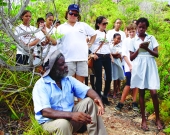
Where did all the soil go? Coastal monitoring as a tool for developing local capacity, raising public awareness and assessing long-term environmental change
Duration: extended Dec 31 2011
Location: Anse Possession, Praslin, Seychelles
Topics: Marine Protected Areas , Management Assessment and Monitoring , Sustainable Business Practices , Climate change , Gender equality , Knowledge management and communications
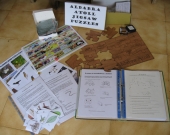
Development and production of two children’s educational activity books and a scientific toolkit for the Aldabra Atoll World Heritage Site
Duration:
Location: Aldabra Atoll and Mahé, Seychelles,with nationwide distribution
Topics: Civil Society Engagement , Marine Protected Areas , Climate change , Gender equality , Knowledge management and communications
MFF Grant Amount: US$24,139 (actual expenditure was US$21,969)
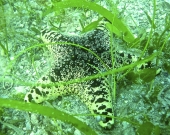
Living resources of the Gulf of Mannar: Assessment of key species and habitats for enhancing awareness and for conservation policy formulation
Duration: 24.5 months
Location: Gulf of Mannar
Topics: Knowledge for Management , Marine Protected Areas , Economic Valuation , Strategies for Management , Capacity Building , Integrated Coastal Planning , Community Resilence
Featured Film - Returning mangroves to Tanjung Panjang
Returning mangroves to Tanjung Panjang, Indonesia © IUCN, 2018
Mangrove forests worldwide have been vanishing at astonishing rates. Tanjung Panjang, Indonesia, which has lost over 60% of its mangroves in the last 3 decades, exemplifies this trend. The creation of aquaculture in nature reserves has in part led to this decrease in mangrove cover. With the help of IUCN's Restoration Opportunities Assessment Methodology (ROAM), local experts and several NGOs are working with current land users and the local government to restore forest landscapes and strive for a more sustainable future.
Related Events
MFF Phase 3 Regional Completion Workshop
Bangkok, Thailand 17 Dec 2018
MFF Phase 3 National Completion Workshops
Each MFF country 01 Nov 2018
14th Regional Steering Committee Meeting
Yangon, Myanmar 28 Sep - 02 Oct 2017
Related Press Releases
Regional symposium puts spotlight on the need to protect marine biodiversity and Asia’s coastal fisheries
Kochi, India 28 Oct 2013
Representatives from more than 12 countries attended a Regional Fisheries Symposium from October 28 to 30 in Kochi, India with the goal of exploring ecosystem-based approaches to protecting fisheries and marine biodivers...
Related Images
Related Publications

Coastal Resilience in Action - Achievements and Lessons Learned from Mangroves for the Future in Pakistan 2014-2018
Author: Zaigham Khan / MFF Pakistan
Publisher: MFF Pakistan
Posted on: 15th Feb 2019
Category: SGF (Small Grant Facility)
Size: 4.5 MB
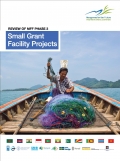
Review of MFF Phase 3 Small Grant Facility Projects
Author: Tom Blomley in collaboration with Mangrove for the Furture
Publisher: Mangroves for the Future, Bangkok, Thailand
Posted on: 12th Feb 2019
Category: SGF (Small Grant Facility)
Size: 5.7 MB



